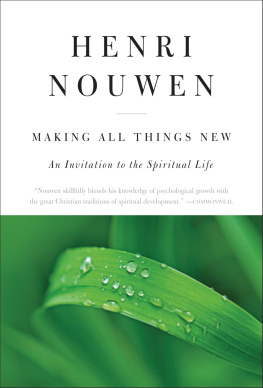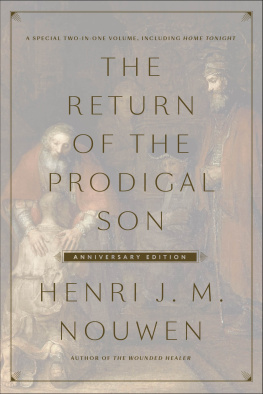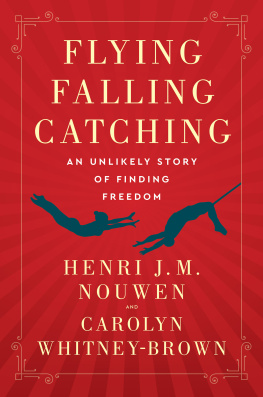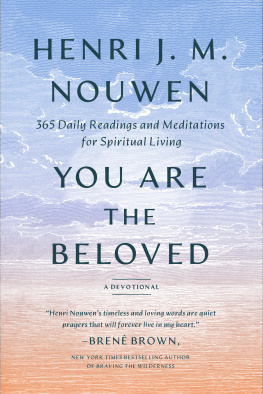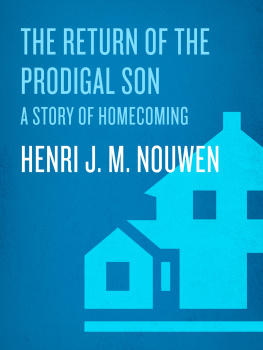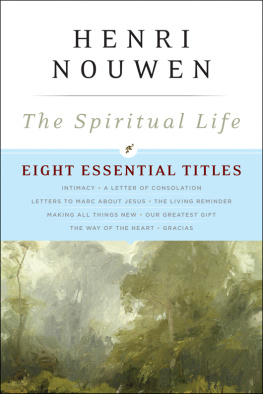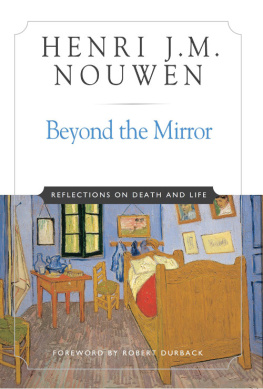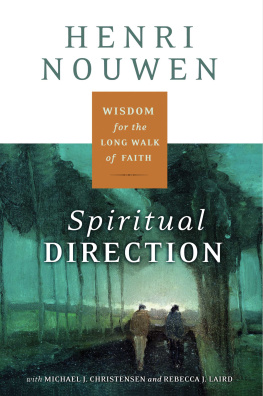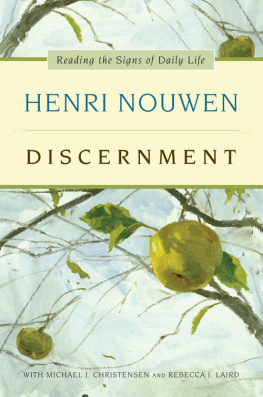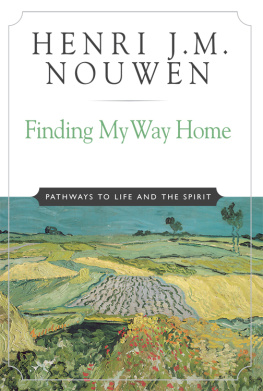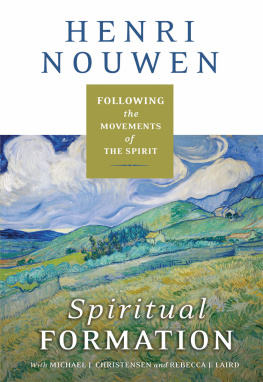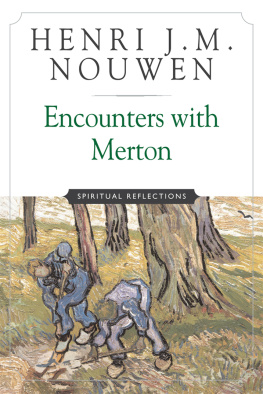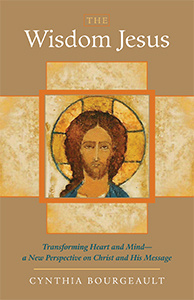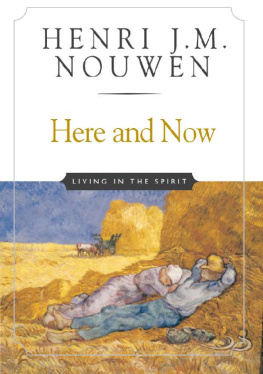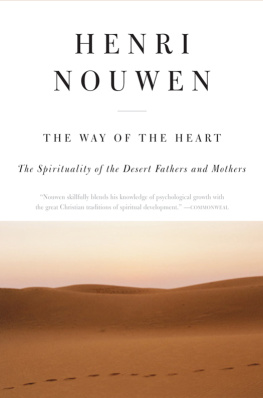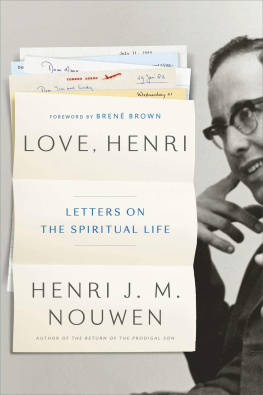Henri J. M. Nouwen - Making All Things New
Here you can read online Henri J. M. Nouwen - Making All Things New full text of the book (entire story) in english for free. Download pdf and epub, get meaning, cover and reviews about this ebook. publisher: Harper Collins, genre: Religion. Description of the work, (preface) as well as reviews are available. Best literature library LitArk.com created for fans of good reading and offers a wide selection of genres:
Romance novel
Science fiction
Adventure
Detective
Science
History
Home and family
Prose
Art
Politics
Computer
Non-fiction
Religion
Business
Children
Humor
Choose a favorite category and find really read worthwhile books. Enjoy immersion in the world of imagination, feel the emotions of the characters or learn something new for yourself, make an fascinating discovery.
- Book:Making All Things New
- Author:
- Publisher:Harper Collins
- Genre:
- Rating:4 / 5
- Favourites:Add to favourites
- Your mark:
- 80
- 1
- 2
- 3
- 4
- 5
Making All Things New: summary, description and annotation
We offer to read an annotation, description, summary or preface (depends on what the author of the book "Making All Things New" wrote himself). If you haven't found the necessary information about the book — write in the comments, we will try to find it.
Making All Things New — read online for free the complete book (whole text) full work
Below is the text of the book, divided by pages. System saving the place of the last page read, allows you to conveniently read the book "Making All Things New" online for free, without having to search again every time where you left off. Put a bookmark, and you can go to the page where you finished reading at any time.
Font size:
Interval:
Bookmark:

In gratitude for
ten joyful years with
students and faculty of the
Yale Divinity School
Do not worry; do not say, What are we to eat? What are we to drink? How are we to be clothed?Your heavenly Father knows you need them all. Set your hearts on his kingdom firstand all these other things will be given you as well.
Matthew 6:31-33
During the past few years, various friends have asked me, What do you mean when you speak about the spiritual life? Every time this question has come up, I have wished I had a small and simple book which could offer the beginning of a response. Although there are many excellent books about the spiritual life, I still felt that there was a place for a text which could be read within a few hours and could not only explain what the spiritual life is but also create a desire to live it. This feeling caused me to write this book. Many of the ideas have been expressed before by others as well as by myself, but I hope and pray that the way they are brought together here will be of help to those who feel filled but unfulfilled.
I want to express my sincere thanks to the Passionist Sisters of Our Lady of Calvary retreat house in Farmington, Connecticut, who by their kindness and hospitality created the quiet space in which this book could be written. I am also grateful for the good advice and enthusiastic support of John Shopp and his colleagues at Harper & Row, and for the generous help of John Mogabgab, Robert Moore, and Wil Rikmanspoel in making the manuscript ready for publication. I owe a special word of thanks to the many students of the Yale Divinity School whose insightful criticisms on the first draft made me rewrite many parts of this text. Finally, I want to say thanks to Henry Morris, who suggested the title to me. I hope that all of us who worked together on this book will find that it was a worthwhile ministry.
In this book I would like to explore what it means to live a spiritual life and how to live it. In the midst of our restless and hectic lives we sometimes wonder, What is our true vocation in life? Where can we find the peace of mind to listen to the calling voice of God? Who can guide us through the inner labyrinth of our thoughts, emotions, and feelings? These and many similar questions express a deep desire to live a spiritual life, but also a great unclarity about its meaning and practice.
I have written this book, first of all, for men and women who experience a persistent urge to enter more deeply into the spiritual life but are confused about the direction in which to go. These are the people who know the story of Christ and have a deep desire to let this knowledge descend from their minds into their hearts. They have a vague sense that such heart-knowledge can not only give them a new sense of who they are, but can even make all things new for them. But these same people often feel a certain hesitation and fear to enter on this uncharted path, and often wonder if they are not fooling themselves. I hope that, for them, this small book offers some encouragement and direction.
But I also want to speak, although indirectly, to the many for whom the Christian story is unfamiliar or strange but who experience a general desire for spiritual freedom. I hope that what is written for Christians is written in such a way that there is enough space for others to discover anchor-points in their own search for a spiritual home. This can only be a true book for Christians when it addresses itself also to those whose many questions about the meaning of life have remained open-ended. The authentic spiritual life finds its basis in the human condition, which all peoplewhether they are Christians or nothave in common.
As the point of departure, I have chosen Jesus words Do not worry. Worrying has become such a part and parcel of our daily life that a life without worries seems not only impossible, but even undesirable. We have a suspicion that to be carefree is unrealistic andworsedangerous. Our worries motivate us to work hard, to prepare ourselves for the future, and to arm ourselves against impending threats. Yet Jesus says, Do not worry; do not say, What are we to eat? What are we to drink? How are we to be clothed?Your heavenly Father knows you need them all. Set your hearts on his kingdom firstand all these other things will be given you as well. With this radical and unrealistic counsel, Jesus points to the possibility of a life without worries, a life in which all things are being made new. Since I hope to describe the spiritual life in which the Spirit of God can recreate us as truly free people, I have called this book Making All Things New .
I have divided my reflections into three parts. In the first part, I want to discuss the destructive effects of worrying in our daily lives. In the second part, I plan to show how Jesus responds to our paralyzing worries by offering us a new life, a life in which the Spirit of God can make all things new for us. Finally, in the third part, I want to describe some specific disciplines which can cause our worries slowly to lose their grip on us, and which can thus allow the Spirit of God to do his recreating work.
INTRODUCTION
The spiritual life is not a life before, after, or beyond our everyday existence. No, the spiritual life can only be real when it is lived in the midst of the pains and joys of the here and now. Therefore we need to begin with a careful look at the way we think, speak, feel, and act from hour to hour, day to day, week to week, and year to year, in order to become more fully aware of our hunger for the Spirit. As long as we have only a vague inner feeling of discontent with our present way of living, and only an indefinite desire for things spiritual, our lives will continue to stagnate in a generalized melancholy. We often say, I am not very happy. I am not content with the way my life is going. I am not really joyful or peaceful, but I just dont know how things can be different, and I guess I have to be realistic and accept my life as it is. It is this mood of resignation that prevents us from actively searching for the life of the Spirit.
Our first task is to dispel this vague, murky feeling of discontent and to look critically at how we are living our lives. This requires honesty, courage, and trust. We must honestly unmask and courageously confront our many self-deceptive games. We must trust that our honesty and courage will lead us not to despair, but to a new heaven and a new earth.
More so than the people of Jesus day, we of the modern age can be called worrying people. But how does our contemporary worrying actually manifest itself? Having looked critically at my own life and the lives of those around me, two words emerge as descriptive of our situation: filled and unfulfilled.
FILLED
One of the most obvious characteristics of our daily lives is that we are busy. We experience our days as filled with things to do, people to meet, projects to finish, letters to write, calls to make, and appointments to keep. Our lives often seem like overpacked suitcases bursting at the seams. In fact, we are almost always aware of being behind schedule. There is a nagging sense that there are unfinished tasks, unfulfilled promises, unrealized proposals. There is always something else that we should have remembered, done, or said. There are always people we did not speak to, write to, or visit. Thus, although we are very busy, we also have a lingering feeling of never really fulfilling our obligations.
The strange thing, however, is that it is very hard not to be busy. Being busy has become a status symbol. People expect us to be busy and to have many things on our minds. Often our friends say to us, I guess you are busy, as usual, and mean it as a compliment. They reaffirm the general assumption that it is good to be busy. In fact, those who do not know what to do in the near future make their friends nervous. Being busy and being important often seem to mean the same thing. Quite a few telephone calls begin with the remark, I know you are busy, but do you have a minute? suggesting that a minute taken from a person whose agenda is filled is worth more than an hour from someone who has little to do.
Font size:
Interval:
Bookmark:
Similar books «Making All Things New»
Look at similar books to Making All Things New. We have selected literature similar in name and meaning in the hope of providing readers with more options to find new, interesting, not yet read works.
Discussion, reviews of the book Making All Things New and just readers' own opinions. Leave your comments, write what you think about the work, its meaning or the main characters. Specify what exactly you liked and what you didn't like, and why you think so.

